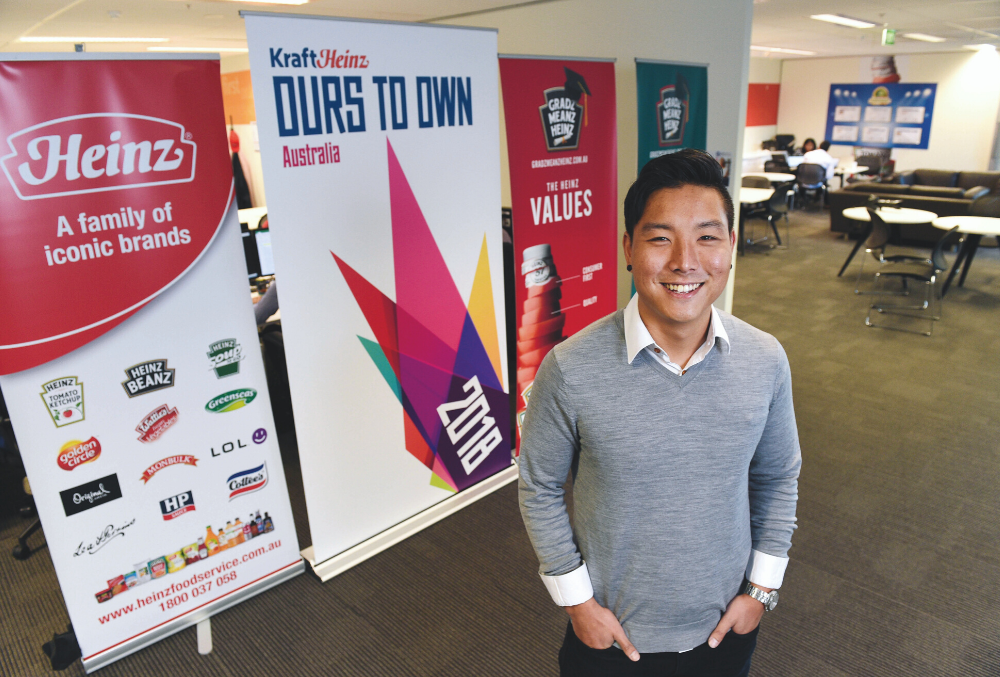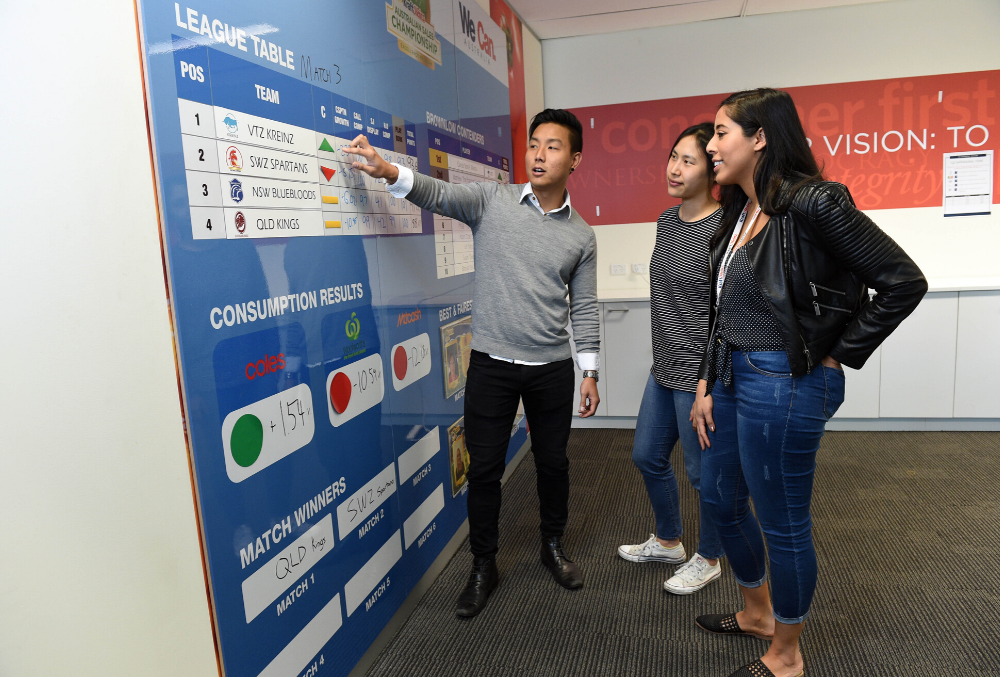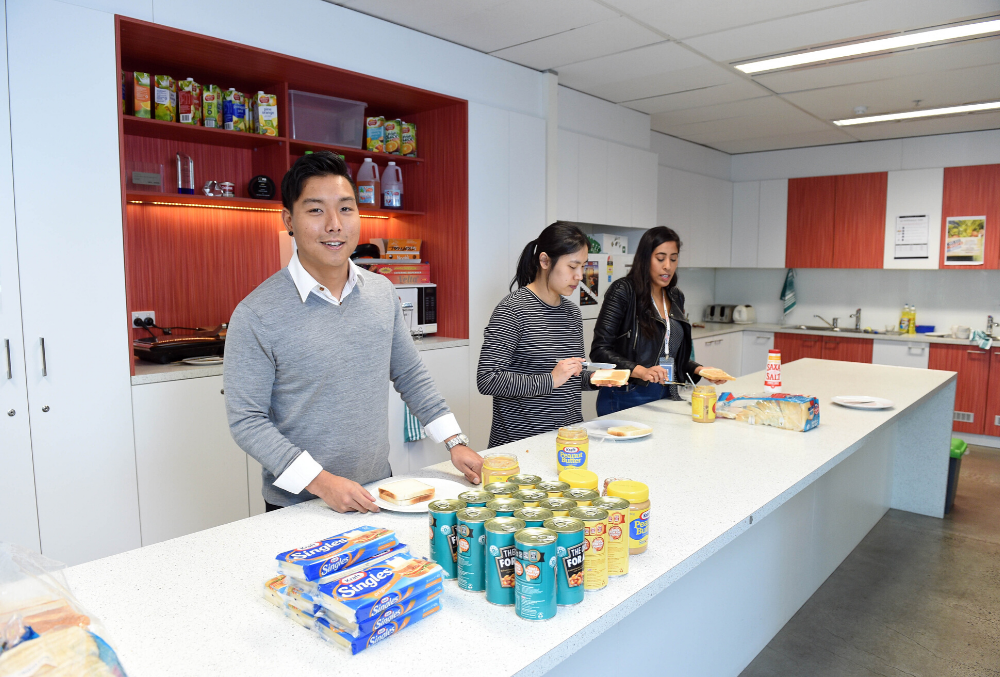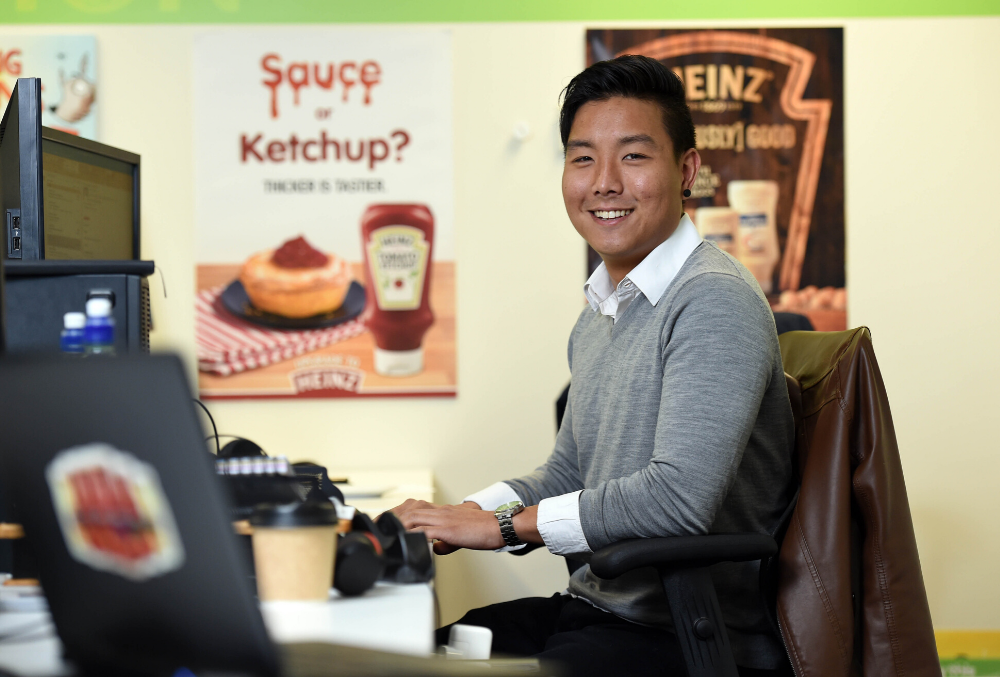Kraft Heinz Company
Calvin Lee
What's your name and job title? What did you study?
My name is Calvin Lee and I currently work as the national implementation manager for the Field Sales department. Back in 2016 when I graduated with a Bachelors in Commerce (Accounting) from Monash University, I never imagined I’d end up being where I am now.
Where did you grow up?
I was born and raised in Sydney up until 2005 when I moved to Melbourne with my family. After the move, I began to pick up various hobbies including soccer, skateboarding and a fascination for music. During my first year in secondary school, I attended a music night where we got to try various instruments and I found on the first go that I was decent at the french horn. I picked up lessons and got involved in the music academy but my passion really flared once I began teaching myself how to play the piano, guitar and eventually writing my own songs. I aspired to be a singer-songwriter throughout my teenage years but because of the volatility of the industry and the competitiveness of the market, I took the safe decision to follow in my older brother’s footsteps and have a crack at commerce.
How did you get to your current job position? For how long have you had it?
After permanently being placed in the Field Sales department, I was tasked with managing and organising a national sales conference for the national Field Sales team in Melbourne. With the conference came the launch of a key incentive program called the Sales Championship, as well as a playbook for a go-to market strategy for the Field team. Upon successfully completing the project, I was offered my current role, which I still manage 14 months later.

How did you choose your specialisation? Were you weighing up any other alternatives before choosing this specialisation?
I spent part of the graduate program induction out in stores working as a field sales representative, calling on and selling to various supermarkets in south-east Melbourne. In that role, I made an impression on the head of field sales for proactively seeking ways to improve myself. When it came to our final placements, the head of field sales vouched to take me in his team. At the time I was open to options with preferences to sit in the Marketing department but I had full trust in the head of field sales that he would look out for me, my best interests and my career path, so I took the plunge into the field.
What was your interview process like? What kind of questions were you asked?
Throughout the whole process, I went through four face-to-face interviews. As I progressed each stage, I had an interview with more senior members of the business. The final interview was with the CFO and CEO together, which was the toughest of them all. They challenged me on my aspirations and why I wanted to join the company – picking apart my answers – but I had come well prepared and it must have shown because I landed the role! Throughout the interviews, I was asked a range of general questions about myself, but for the most part, I was asked behavioural questions in relation to our core values, particularly honing in on leadership, ownership and meritocracy.
Suppose a student was considering your career. What would you advise them to study? Are there any soft skills it would be beneficial for them to develop? Should they pursue any sort of work experience?
For my role specifically, a communications degree would be the most beneficial study to take on. One of the key aspects to the role is to efficiently and effectively communicate a strategy plan that you have taken part in designing, to different audiences. I help build resources that communicate to various stakeholders with different needs, including grocery store managers, our internal executive Leadership team members and most importantly, our team of field sales representatives.

What does your employer do?
As one of the leading food and beverage companies in the FMCG industry, Kraft Heinz produce and provide high quality and nutritional pantry items and ingredients to the general public and business through the grocery market and foodservice sector.
What are your areas of responsibility?
There are a heap of different things that the role entails but I’ll try to keep it fairly top line. My primary role in the team is to serve as the funnel of communication from the overall business to the Field Sales team.
The Sales and Marketing teams work closely together to work on a campaign and my job is to take all the information and translate that into a plan for the Field Sales team to execute at store level, with the end goal of ensuring that the campaign interacts with customers in stores. This means I work on a lot of communication decks for the Field Sales team. I work with both our sales intelligence manager and the head of field sales on strategies and the best way to execute these to drive more sales. If our Field team require resources such as point of sale for the execution, my role is also to ensure that everything is available for the sales representatives to sell and build displays in store. In this respect I assist with planning the production and managing timelines, and usually do a lot of headbutting with other teams to ensure they’re sticking to the deadlines! I also manage the budget and payments for all the expense items related to our field, including the leased vehicles for the sales representatives and third-party merchandisers.
An additional responsibility I have taken on is being the travel package owner for ANZ, meaning I manage the travel budget for the Australian and New Zealand business, tracking our spend and working with our travel agency and Procurement team to seek cost-saving opportunities.
Can you describe a typical work day? What was the last thing you worked on?
Every morning on a Monday I’ll sit down with a pen and paper and write out all of the outstanding things that need to be done and what I aim to achieve. From there, I start allocating them to different days as action items to be completed.
Every day is different and presents new challenges. If I had to explain a typical day, it could entail building a communications deck for the field using PowerPoint; checking in with my counterpart in marketing who takes care of our point of sale to ensure everything is running smoothly; attending meetings with state leaders who look after the sales representatives directly to align on action plans for the next execution cycle; or working on an execution strategy or incentive campaign measurement metric with the sales intelligence manager in my team.

What sort of person succeeds in your career?
To succeed in this role, you have to be a strong multi-tasker. There are multiple overlapping projects that could be running at any point in time and most of the time they don’t relate to each other. If you want the best outcome, you must be able to keep a close tab on everything that’s happening and ensure nothing is forgotten. You must also be resilient and open to change, as plans change all the time. It may be that something isn’t working as well as you would have expected, an issue has arisen that you never accounted for or maybe the business wants a change in priorities. Whatever it may be, you just have to expect that things won’t always go according to plan
What are the career prospects with your job? Where could you or others in your position go from here?
A positive aspect of being the implementation analyst for the field is that you have touchpoints with multiple facets of the business. I keep close to the Sales team and Marketing team and have routines with Finance, Procurement (for all the vendors we are associated with) and even Supply Chain on occasion. It has allowed me to get a decent understanding of what their objectives are and what their department does. With having experience in project management and developing a strategic mindset, working in this role gives you the potential to transition smoothly into any of these departments.
The next natural step for this role would be to become a state leader: heading a team of sales representatives where you can use your skills to manage the team to drive strong results. From here you have opportunities to strengthen your negotiation skills as you deal with smaller accounts. Eventually, you could pave your way towards a national account manager role or even become the head of field sales.
Could someone with a different background do your job?
Given that I come from an accounting background, I’m living proof that anyone in any background can do my job. Most of the skills required in the role I learnt by living and breathing it every day. So long as you possess the value of work ethic and display a willingness to learn and improve, anyone can be where I am.

What do you love the most about your job? Which kind of task do you enjoy the most?
My favourite aspect of the job is that I play a key role in determining our go-to-market strategy for a team of 40 sales representatives across Australia. I am empowered to really make a difference in the way we work, what we are aiming to achieve and how we aim to achieve it; it inspires me to put my heart into what I do.
My favourite task is the strategic planning for an execution cycle where I bounce ideas with my colleagues, using data and historical results to determine the best way to execute. Once the strategy is established it’s all about rolling your sleeves up and making it happen.
What’s the biggest limitation of your job? Do you bear a lot of responsibility? Do you have to work on weekends? Are stress levels high?
The biggest limitation is that since you’re involved in multiple projects with different departments, there are a lot of things that inevitably pop up, requiring your immediate attention. It ends up pulling your focus away from key things that you aim to achieve and derailing your timelines, which jeopardises your own personal goals.
What would your career be if you weren’t doing what you’re doing now?
To be honest, I have no idea what I would be if I wasn’t in this role. I’ve always had an open mind so I could be anywhere. I landed in FMCG with Kraft Heinz because they were the only company out of the many I applied for that took a gamble and took me on board. Had they not put their faith in me, I could have ended up in any industry or may still have been a specialty coffee barista, which I was working as in a full-time capacity before joining the company.
Which three pieces of advice would you give to a current university student?
- Relax: Once you start working full time your mind is working constantly. Almost every day when I step out of the office, my brain feels like I just stepped out of a three-hour commerce exam.
- Live it up and enjoy yourself: Time flies when you’re working and you’ll soon realise how little free time you have compared to your university days. Enjoy your flexible schedule and keep catching up with friends during weekdays while you can!
- Stress less, it’s not the end of the world: Exam time is incredibly stressful and exhausting for everyone but at the end of the day, missing your grade by a mark or even failing an exam is not the end of the world. If things don’t go as planned, there’s no point tearing your hair out over it. Accept it, set yourself a new target and go for it. Life is too short to be worried all the time.